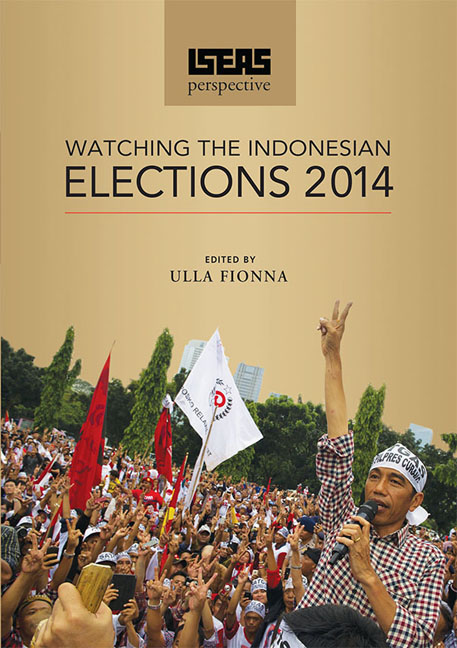Book contents
- Frontmatter
- Contents
- Foreword
- Introduction
- 1 The Gubernatorial Race in Jakarta: Background and Implications
- 2 Indonesian Parties Struggle for Electability
- 3 Who Will Be Indonesian President in 2014?
- 4 Indonesian Presidential Election Forcing Rejuvenation of Parties
- 5 Resisting Democracy: Front Pembela Islam and Indonesia's 2014 Elections
- 6 Getting to Know the Contestants of the 2014 Indonesian Parliamentary Elections
- 7 A Snapshot of the Campaigning in Indonesia's 2014 Legislative Elections
- 8 Unpacking the Results of the 2014 Indonesian Legislative Elections
- 9 Indonesia's 2014 Legislative Elections: The Dilemmas of “Elektabilitas” Politics
- 10 The Islamic Factor in the 2014 Indonesian Elections
- 11 Vote-buying in Indonesia's 2014 Elections: The Other Side of the Coin
- 12 Gap Narrows Between Candidates in Indonesian Presidential Elections
- 13 Analysing the Economic Platforms in the Indonesian Presidential Election
- 14 Indonesian Islamic Parties After the 2014 Elections: Divided and Self-Centred
- 15 Safeguarding Indonesia's Pluralism: An Essential Task for Joko Widodo
- 16 Jokowi's Key Economic Challenge: Improving Fiscal Policy for Equitable Growth
- 17 Crossing the River While Avoiding the Stones: Jokowi's Run-up to the Presidency
- 18 Post-elections Indonesia: Towards a Crisis of Government?
- Epilogue: Jokowi's First Months: Compromise Cabinet, Subsidy Cuts, and Corrupt Coalition
11 - Vote-buying in Indonesia's 2014 Elections: The Other Side of the Coin
Published online by Cambridge University Press: 29 July 2017
- Frontmatter
- Contents
- Foreword
- Introduction
- 1 The Gubernatorial Race in Jakarta: Background and Implications
- 2 Indonesian Parties Struggle for Electability
- 3 Who Will Be Indonesian President in 2014?
- 4 Indonesian Presidential Election Forcing Rejuvenation of Parties
- 5 Resisting Democracy: Front Pembela Islam and Indonesia's 2014 Elections
- 6 Getting to Know the Contestants of the 2014 Indonesian Parliamentary Elections
- 7 A Snapshot of the Campaigning in Indonesia's 2014 Legislative Elections
- 8 Unpacking the Results of the 2014 Indonesian Legislative Elections
- 9 Indonesia's 2014 Legislative Elections: The Dilemmas of “Elektabilitas” Politics
- 10 The Islamic Factor in the 2014 Indonesian Elections
- 11 Vote-buying in Indonesia's 2014 Elections: The Other Side of the Coin
- 12 Gap Narrows Between Candidates in Indonesian Presidential Elections
- 13 Analysing the Economic Platforms in the Indonesian Presidential Election
- 14 Indonesian Islamic Parties After the 2014 Elections: Divided and Self-Centred
- 15 Safeguarding Indonesia's Pluralism: An Essential Task for Joko Widodo
- 16 Jokowi's Key Economic Challenge: Improving Fiscal Policy for Equitable Growth
- 17 Crossing the River While Avoiding the Stones: Jokowi's Run-up to the Presidency
- 18 Post-elections Indonesia: Towards a Crisis of Government?
- Epilogue: Jokowi's First Months: Compromise Cabinet, Subsidy Cuts, and Corrupt Coalition
Summary
INTRODUCTION
Vote-buying in Indonesian elections is certainly nothing new. Since the days of Suharto, serangan fajar (dawn attack) — which refers to the effort of bribing voters to vote for a particular party conducted in the early hours on polling day — has continued to play an important role to this day. Since the fall of Suharto's New Order in 1998 however, there are two important trends to note. On the one hand, the predictable effects of vote-buying may have been reduced by greater awareness amongst voters, as they now enjoy the freedom to vote and know they can benefit by taking the bribe and still vote according to their own preference. At the same time, parties have quickly realized that vote-buying is expensive and probably not very effective.
In the current electoral system, candidates are at the centre of the voting process. Put simply, candidates largely run and fund their own campaigns, and they face tough competition from those not only from other parties, but also from their own parties, to win seats. As such they have been forced to choose methods they deem most efficient in grabbing votes amongst the electorate to which they are largely unknown. One simple way to do this is to attract votes with material benefits, which has resulted in large-scale vote-buying. The 2014 elections have demonstrated that this phenomenon has evolved to be more extensive, sophisticated, and better organized than before. Indeed, various observations have strongly indicated that, compared to the 2009 elections, the scale and extent of money politics in this year's elections have been remarkable. An independent observer has used the words “massive, vulgar, and brutal” to describe the extent of transactional politics during the elections. The wide-ranging cases that have been reported featured most notably the door-to-door approach, where typically voters would be handed an envelope containing a specific candidate's name and a certain amount of money to persuade them to vote for that particular person. Less-direct and more innovative methods are plenty, including interest-free loans, free blood tests, plant seeds for farmers, insurance for motorbike taxis, and lucky draws offering freezers and even a Hajj trip.
Vote-buying also takes place at different stages of the campaign. Candidates provide gifts as a way to introduce themselves to voters. These could then be followed up by hand-outs at mass rallies, and donations to build or improve community facilities.
- Type
- Chapter
- Information
- ISEAS PerspectiveWatching the Indonesian Elections 2014, pp. 94 - 102Publisher: ISEAS–Yusof Ishak InstitutePrint publication year: 2015

